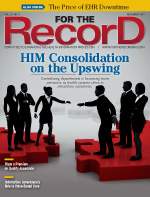November  2017
2017
Editor's Note: What's the Right Amount of Documentation?
By Lee DeOrio
For The Record
Vol. 29 No. 11 P. 3
We've read the studies and heard the complaints about how physicians spend far too much time documenting patient care. Basically, the battle cry is "less is more."
Why should physicians dutifully take comprehensive notes when their passion is healing the sick, not penning odes to the duodenum?
The issue is complicated, fueled by the always contentious reimbursement and quality factors that have long been a drag on the US health care system. In short, many believe physicians are documenting extensively for all the wrong reasons. Instead of producing notes that enable better care moving forward and that can be easily digested by other providers, we're left with generalizations, filler, and an absence of patient input.
For example, when I view my records online, it seems my physician and I have had discussions about diet. Is that so? Funny, but I can't recall fruits and vegetables entering into the encounter. I'm sure it's merely a box that needs to be checked or a measure that must be met for every visit.
Recently, HHS Deputy Assistant Secretary for Health Technology Reform John Fleming, MD, hinted that the Office of the National Coordinator for Health Information Technology and the Centers for Medicare & Medicaid Services were considering taking action to change reimbursement and reduce physician documentation. According to Fleming, physicians would be reimbursed for any given visit based on their weighted historical average of all their previous visits, the hope being that "overdocumentation" that produces what is essentially overcoding would be eliminated. Additionally, physician stress levels would be reduced.
Whether this remedy would fly is up for debate, but there is no denying a happy zone where quality documentation meets content physicians must be established. "We don't need to reduce physician documentation—we need to ensure that it is worthwhile documentation. It can be excessive or too cryptic, but the problem is that it isn't fulfilling the goal of telling the story," says Erica E. Remer, MD, FACEP, CCDS, founder and president of Erica Remer, MD, Inc. "Health care is not about making physician's lives easier; it is about providing better, safer, and higher quality care for the patient. If we eliminate stupid rules which make providers jump through meaningless hoops and instead reward good practice, we would be better off."
The sobering fact is that things are only going to get more difficult as data analytic efforts intensify. "The documentation demands on physicians are very significant and likely to continue to grow since there are so many potential uses for the information captured during patient care. This includes determining appropriate payment for individual care encounters in a fee-for-service context, as Dr. Fleming refers to," says Eric Rose, MD, director of clinical terminology at Intelligent Medical Objects. "At the same time, practicing medicine requires time and concentration, and it's essential to minimize disruptions to physicians' workflow and thought processes when they're taking care of patients."
It's a tall task but one that professional organizations such as the American Medical Association must approach with the patient in mind.



